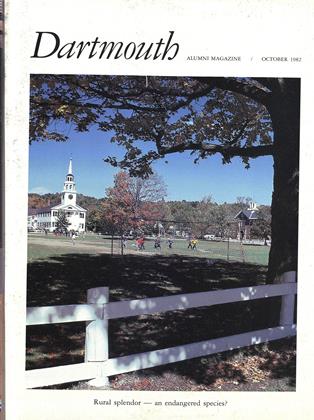At the College's 213 th convocation, President McLaughlin marked the tenth anniversary of the admission of women by amending Plato. Referring to the ancient philosopher's comment, "Education is a way to produce good men, and once produced such men will live nobly," McLaughlin articulated Dartmouth's modern challenge: "To use a learning experience to produce good men and women who will, in part because of our lessons, act nobly throughout their lives."
Speaking to an audience of 2,000 students, faculty, and administrators gathered in Thompson Arena, McLaughlin recalled the unpredictable events of the past twenty years among them Kennedy's assassination, the Vietnam War, the emergence of many new nations, and the exploration of outer space. He spoke of our own times as war-torn and financially parlous and assessed as the greatest need of coming times a new brand of leadership.
"Leadership, at all levels, has failed to recognize and to respond to the emergence of new conditions involving an increasingly pluralistic and increasingly self-interested world-wide populus," said McLaughlin. He went on to express a dissatisfaction with the way the American citizenry is educated: "Our society has not been educated to expect enough from its leaders, nor has it had the capacity to nominate consistently those possessing the ability to govern effectively and well. Undoubtedly, history will indicate that we are currently living in a period of structural transition. It is equally clear that society now needs perhaps as never before leaders and an informed, motivated citizenry."
McLaughlin affirmed as Dartmouth's raison d'etre the playing of a "vital, positive role in providing an answer to society's needs," and he exhorted the students to use fully the privilege of being at the College and to dedicate themselves to "the serious pursuit of intellectual achievement."
"The winter term {in the 1850s} was a time when the majority of the students were absent from Hanover upon teaching engagements, when no member of the faculty was desirous of active work, and when those students who were in residence probably did their tasks in a perfunctory fashion." Richardson's History of Dartmouth College
 View Full Issue
View Full Issue
More From This Issue
-
 Feature
FeatureWHY STUDY WOMEN?
October 1982 By Mary Ellen Donovan -
 Feature
FeatureHome, Home on the Plain
October 1982 By Jeffrey Boffa -
 Feature
FeatureCan the Summer?
October 1982 By Shelby Grantham -
 Sports
SportsAn Irish Connection and a Quaker Shutout
October 1982 By Brad Hills '65 -
 Class Notes
Class Notes1982
October 1982 By John King -
 Article
ArticleSexagenarian Hiker Travels Light on the Appalachian Trail
October 1982 By D.C.G







